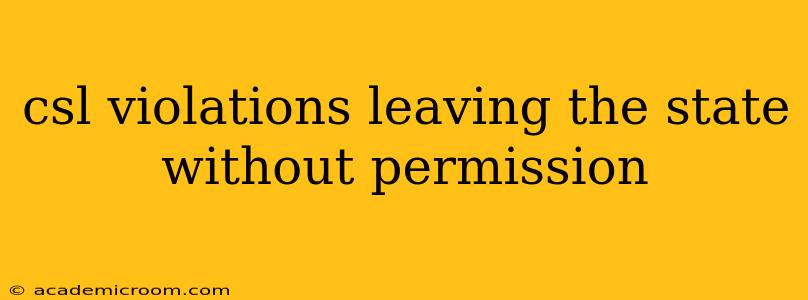Community Supervision of Law (CSL) is a crucial part of the justice system, providing a structured path towards rehabilitation for individuals convicted of crimes. A key element of this supervision involves adhering to specific conditions, and violating these conditions can lead to serious consequences. One common violation centers around leaving the state without prior permission. This post explores the complexities of this issue, addressing frequently asked questions and providing crucial information for those under CSL.
What Happens if You Leave the State on CSL Without Permission?
Leaving the state without explicit permission from your probation or parole officer is a serious violation of your CSL conditions. The consequences can vary significantly depending on the specifics of your case, the state's laws, and the severity of the original offense. However, potential repercussions can include:
- Issuance of a warrant for your arrest: A warrant will be issued, leading to your apprehension and return to the state.
- Revocation of your CSL: Your community supervision may be revoked, leading to incarceration. The length of the incarceration will depend on your original sentence and the severity of the violation.
- Increased sentence: In some cases, leaving the state without permission can result in an increased sentence.
- Additional charges: Depending on the circumstances, you might face additional charges, like contempt of court.
Can I Leave the State on CSL for a Family Emergency?
While leaving the state without permission is generally prohibited, there might be exceptional circumstances that warrant consideration. A true family emergency, such as a serious illness or death of a close relative, could be grounds for requesting permission to leave. It's crucial to contact your probation or parole officer immediately to explain the situation and request permission. Providing documentation to support your claim will strengthen your request. Failing to do so and leaving without permission will still result in a violation.
How Do I Get Permission to Leave the State on CSL?
The process for obtaining permission to leave the state varies by jurisdiction, but generally involves:
- Submitting a written request: This request should clearly outline the purpose of your travel, dates of travel, location you plan to visit, and contact information while you're away.
- Providing supporting documentation: This might include plane tickets, hotel reservations, or medical records (in case of a medical emergency).
- Meeting with your probation or parole officer: You will likely need to meet with your officer to discuss your request and answer any questions they may have.
- Awaiting approval: The officer will review your request and supporting documents before deciding whether to grant permission.
Always initiate this process well in advance of your planned travel. Rushing the process increases the likelihood of your request being denied.
What if I Accidentally Violated My CSL by Leaving the State?
Even an accidental violation can lead to serious consequences. If you inadvertently left the state without permission, immediately contact your probation or parole officer. Be honest and transparent about the situation. While honesty doesn't guarantee leniency, it demonstrates a willingness to cooperate, which may be considered during the hearing process.
Can I Travel Out of State for Work on CSL?
Similar to other travel requests, securing permission to travel for work requires proactive communication with your probation officer. Provide documentation of your employment and the specific dates of your work-related travel. Be prepared to demonstrate the legitimacy of your travel and your commitment to fulfilling your CSL obligations.
This information is for educational purposes only and does not constitute legal advice. Consult with a legal professional for guidance specific to your circumstances. Navigating the complexities of CSL requires careful adherence to the rules and open communication with your supervising officer. Remember, proactive communication is your best defense against accidental violations.
